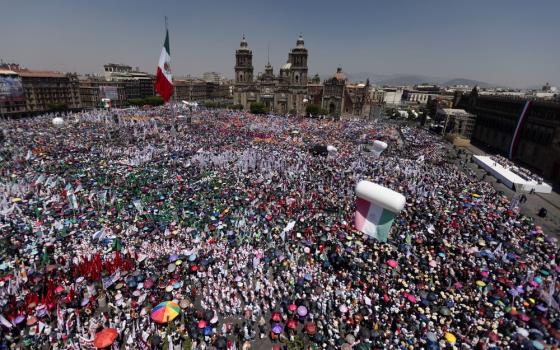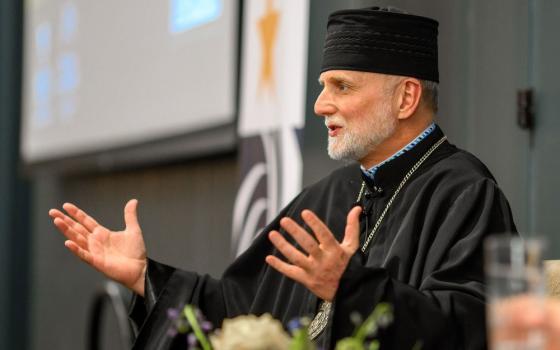I arrived in Kansas City, Mo., today and wasn’t here more than three hours when someone handed me a recent letter headlined “Bishop’s Annual Appeal.” The bishop who is doing the appealing, of course, is Robert Finn, recently convicted in county court for failing to report suspected child abuse and spared a fine and jail time under an agreement worked out with prosecutors.
It was somewhat amusing, then, to see the line just under that heading:
“Honoring Bishop Emeritus, Raymond J. Boland – 25 Years As A Bishop.”
Boland was hardly a hero when it came to policing sex abuse crimes. He demonstrated the same lapses as was the case with many members of the hierarchical culture of his generation. But on other matters he was, in temperament, management style and pastoral approach, quite a different bishop from Finn, who within days of taking over undid by fiat virtually everything that had been put in place by Boland and several of his immediate predecessors. Generally speaking, Boland was respected; in the same degree, it might safely be said, Finn sets teeth on edge.
Whether or not Boland gave permission for his name to be used this way, it seems clear that Finn — having violated not only civil law but also church law in the form of the charter fashioned by the U.S. bishops themselves, and having made the diocese of Kansas City-St. Joseph a source of embarrassment and derision nationwide — had to find some sympathetic figure on which to hang his fund raising ambitions.
Earlier in the week I spent a day at the meeting of the U.S. bishops in Baltimore, watching them run through the beginning of an agenda that appeared to be a playbook for an institution in deep denial. The church is bleeding people faster than any other religious institution in the country (its bottom line saved only by immigration, largely from Mexico and the rest of Latin America); the priest shortage continues apace; the number of parishes and schools continues to dwindle. It is evident that the persuasive power, not to mention teaching authority, of the U.S. episcopacy has bottomed out, if the results of the recent elections are any indication. The president so vociferously disparaged by some of the bishops won a convincing victory. And all of the ballot initiatives in four states regarding same sex marriage were decided in ways favorable to the gay and lesbian communities.
I watched as Baltimore Archbishop William Lori gave a largely self-congratulatory presentation about the bishops’ religious freedom campaign and the fortnight for freedom, an effort judged largely a flop anywhere outside the bishops’ meeting room.
I listened as Cardinal Timothy Dolan of New York, in his address as president of the conference, gave a rather interesting talk on the need for personal repentance on the part of even bishops. But on the most public of sins — the bishops’ role in covering up the ongoing sex abuse crisis – he made only one reference, and that had to do with an event in Ireland.
All the while, sitting in the room, was Finn, perhaps the most glaring contemporary exhibit of the bishops’ total disregard of their own promises of transparency and accountability. Not once was he mentioned, nor was mention made in that meeting of the fact that a sitting bishop had been convicted of a crime that, were he a priest, would disqualify him from ministry. The fine print in the charter — rather the script written in invisible ink — must read: None of the above applies to bishops.
Back in Kansas City, Finn revives the bishop-as-victim theme by noting, in a paragraph that obliquely refers to his criminal conviction:
“In the days following the long legal struggles that not only confronted the diocese and me, but all the people of God in our Catholic community, we try to get past our own hurt.”
The arrogance and deflection of the truth in that statement is simply breathtaking. The hurt the church endures is none other than Finn’s insistence on staying in office. The “legal struggles” that confronted the diocese and Finn had nothing to do with the People of God, a phrase that, given his ultra conservative ecclesiology in every other circumstance, is a purely opportunistic use of the populist notion of that Vatican II phrase. Finn, the Opus Dei priest and doctrinal stickler, suddenly becomes victim and Vatican II liberal in one fell swoop.
Perhaps Finn feels some pain asking the People of God for their money, knowing that implicit in handing over their money would be a certain trust of his stewardship of the diocese. And he has done everything possible to obliterate that trust.
In the end, it is Finn, not Boland, who signed the letter. We know that the two men have little in common other than the title “bishop.” We know from extensive interviewing for a story done the year after Finn took over, that the two communicated almost not at all and that during the year in which Finn served as coadjutor, he had no questions for his predecessor. He didn’t need to ask. He was soon to demonstrate that he thought he had all the answers.
What he demonstrates now is that he doesn’t need answers because he has a rationale for every occasion. So, convicted of child endangerment for his inexplicably inept handling of a priest who stored and produced child pornography, the bishop turns on the personal piety, calling on the name of Christ, to whom one must always say “yes.” He also turns the spotlight on his predecessor, hoping that a reservoir of goodwill for Boland will result in a successful fundraising campaign. Raising money becomes a way of “recognizing his service to the church.”
The diocese is long overdue for new leadership it can trust. And the former bishop deserves better for his 25th anniversary than to be used as a fund-raising attraction.




